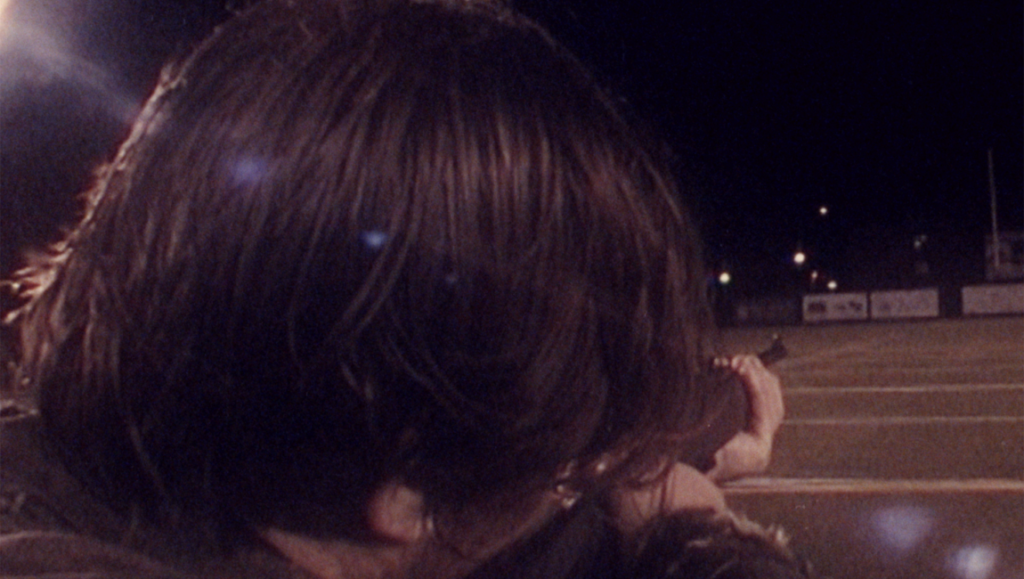A dark night of the soul that gradually metastasizes into a howl of impotent anger at life itself, Mitchell Stafiej’s The Diabetic follows 30-something Alek (James Watts) as he flees his apartment in the city and returns to his parents’ suburban home in an attempt to relive his adolescence. A millennial version of a midlife crisis, Alek can’t seem to figure out what he wants, his own anxieties and ambivalences playing out via an abstracted wasteland of post-industrial detritus and generic suburban sprawl. Upon his arrival, Alek has a quiet dinner with his parents while texting old buddies, eventually sneaking out after his parents fall asleep to hit up some bars with the old crew. He’s shocked when no one shows up except Matt (Travis Cannon), and as the two catch up over beers and shots, Matt explains that no one else is there because they’ve all moved away. Alek is disappointed; it quickly becomes clear that Alek doesn’t particularly like Matt, and that the two weren’t actually good pals back in the day, but Alek is desperate for a drinking partner. The night escalates from there, as Alek pressures Matt into increasingly absurd situations — the duo harass a convenience store clerk to sell them beer after hours, break into a stranger’s backyard to swim in a pool, and eventually run afoul of a group of young girls who pull a gun on them. Throughout the evening Alek has to frequently check his blood sugar levels due to the obscene amounts of booze he’s consuming while Matt tries to reign in Alek’s more extreme impulses. But it’s a losing battle, and Alek’s condition eventually catches up with him.
Alek isn’t wrong in his critique of banal suburban living, not exactly, but his above-it-all ire comes across like sour grapes. He wants to pretend like he’s better than all this, but he’s the one who has come crawling back. Matt eventually calls him out and says that his complaining sounds a lot like jealousy. Indeed, Alek is an asshole. He needles and pressures people for no apparent reason, pushing them away even as it becomes increasingly clear that he’s in need of companionship. It would all be unpalatable if Alek wasn’t at least a little relatable, a difficult needle to thread that Watts pulls off with aplomb (truly, it’s one of the best performances of the year, a masterclass in nervous agitation and ingratiating neediness). For all of the film’s non-stop chatter, Stafiej leaves key points to inference — there’s only a passing mention that Alek is an unsuccessful filmmaker, and the audience is left to discern on its own the state of Alek’s relationship with his parents and his significant other (who we glimpse only once, ignoring Alek as he leaves and tries to say goodbye).
While this sort of talky, state-of-the-generation narrative has plenty of antecedents — Mike Leigh’s Naked, Linklater, and early Alex Ross Perry all come to mind — Stafiej’s unique formal approach elevates The Diabetic from well-acted indie to something altogether more unique: according to the director, the movie was shot on Hi-8 and then transferred to 16mm film, with certain sequences also then transferred from 16mm to VHS and dubbed over and over again, giving everything a fuzzy, hazy look. The footage becomes a relic from a long-ago childhood, like old camcorder footage that’s become distorted through age (someone in their early to mid-30s would likely be the last of their generation to conceivably grow up with VCRs and old CRT TVs in lieu of flatscreens, DVDs, and streaming). Much of the film is composed of extremely tight closeups, zeroing in on faces and eyes while eschewing virtually any kind of contextualizing information. Viewers never get a sense of any of the actual spaces these characters are inhabiting — bars, apartments, stores, and houses are defined only by blurry, peripheral glances. Interspersed throughout are abstracted interludes that look like fields of overlapping colors floating in undefined spaces, more Brakhage than anything else. The occasional views of the landscape become pools of light, buildings and streetlights reduced to opaque color fields that meld into one another. And there’s a fascinating tension between the grainy, small gauge film and digital artifacts, all liminal spaces that ooze together.
Working with cinematographers Ariane Falardeau St-Amour & Beatrice Scharf-Pierzchala, Stafiej has found a keen visual metaphor for Alek’s mental state, literally unmoored and adrift in this unstable world. One wishes that the film didn’t eventually feint toward potential violence, which feels more like the filmmaker trying to goose the audience than a natural endpoint for this (loose) story, but the film’s final shot is so beautifully evocative that one can forgive this minor misstep. Ultimately, The Diabetic becomes a deeply moving reminder that you can’t go home again, even if there’s no other place for you in the world. This feels like a defining text for people of a certain age, the analog companion to Jane Shoenbrun’s digital We’re All Going to the World’s Fair. And like that one, this too is a remarkable film.
Published as part of Fantasia Fest 2022 — Dispatch 2.


Comments are closed.